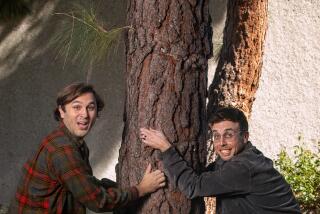Musicians put veterans’ experiences into song
Darden Smith, who knows nothing of being a soldier in combat, and Kenneth Sargent, who has never written a song, are working together this day.
Sargent, an Army staff sergeant, talks of his fear when he was wounded by a rocket attack in Iraq, how his legs went numb and how he was overwhelmed by a sense of isolation when he was strapped to a stretcher and lifted onto the medevac helicopter sent to rescue him from the battlefield.
Smith takes Sargent’s words and adds musical stylings from his six-string guitar. As Sargent watches and listens, Smith sings the soldier’s words in country-western tones:
After it was over the calm was terrifying
I tried to look around to see where I was lying
What seemed like hours was only minutes to me
Before I knew it I was on that Blackhawk not knowing my destiny.
The unlikely pairing of the singer-songwriter from Austin, Texas, and the noncommissioned officer from a field artillery unit is part of an effort by a Colorado-based nonprofit organization to use music to help military veterans with their post-war transition, either to civilian life or back to military duty.
Many of the veterans, like Sargent, have been wounded in combat and are still struggling with injuries and post-traumatic stress disorder. Some have been forced out of military service by their injuries — the term is “medically retired” — and have lost the comradeship and sense of purpose that were central to their lives. Others are alienated by suddenly being returned to the civilian community where few people know, or care, about the gritty details of life and death in a war zone.
The goal of the music camp program is to allow the veterans to unburden themselves of memories bottled up inside and hindering their transition. Two such camps have been held; more are planned, depending on fundraising. So far, about 20 veterans have participated; organizers hope for more as word spreads.
“It gives the veterans an opportunity to put their experiences into words and melody so they don’t have to carry those bad things with them,” Smith said.
The music camps also bring together civilians and military personnel — two segments of American society not often in contact in a country in which national security is no longer a shared responsibility. “There’s an us and them in America,” said Smith, “when it should just be us. I want to use music to change that.”
Sargent, 41, a native of Killeen, Texas, has undergone repeated surgeries for his back injuries and hopes to return to active duty and deploy to Afghanistan. His tattoos mark his combat deployments, with four blood droplets symbolizing close friends killed in Iraq. He puts the songwriting experience in military terms.
“With my song, it’s like I can finally put my pack down,” he said. “The hardest thing about coming home is that people don’t understand what we went through because we don’t talk about it. I want people to listen.”
Tyler Daly, 28, from Loomis, Calif., did two infantry deployments to Iraq. Injured by a roadside bomb, he was medically retired from the Army as a sergeant and is blunt about why he came to the music camp. He has suffered depression, nightmares and anxiety and has been diagnosed with traumatic brain injury.
“To me, it’s about healing,” he said of the recent camp. “I just want to heal.”
His song, “Living on the Edge,” written with fellow Army veterans Pat Marques and John Wall and put to music by singer-songwriter Jay Clementi, explores a side of military life that may seem counterintuitive to civilians: the excitement of combat, excitement that makes life back home seem stale.
I can’t get that feeling back
It’s time I tell my story
About how it was back then
I’m living on the edge of dying.
Songs of experience
The songs are markedly apolitical; most of the veterans are resolutely proud of their service. But occasionally a note of bewilderment about the meaning of the U.S. mission in Iraq creeps in.
Katie Robinson, 43, a combat videographer from Detroit who is medically separating from the Air Force, wrote “Back to Life,” with Smith and singer-songwriter Georgia Middleman. Among the lines: “Sometime I have to see / The point of it all / Was I right to answer the call?”
Most of the songs center on the experience of combat: being pinned down by enemy fire, the horror of a bomb exploding beneath your Humvee, the death of a buddy.
The music camp for veterans was the brainchild of C.W. Conner, the Army veteran who founded LifeQuest Transitions two years ago in Colorado Springs, Colo. LifeQuest uses sports to help military veterans retrieve their self-confidence — an approach used, among other places, at the Naval Medical Center San Diego.
LifeQuest has not been able to secure government funding, and the competition for support from corporations is fierce. Donations for nonprofits working with veterans dropped sharply after President Obama announced that U.S. troops were to leave Iraq by the end of last year, Conner said.
“People believe the war is over,” he said. “They’re tired of war. They want to move on. But for the veterans, the war is still with them.”
Support has been strong in Colorado Springs, home to the U.S. Air Force Academy and adjacent to the Army’s Ft. Carson. For the music camp last month, the Garden of the Gods lodge donated rooms and meals for the veterans and singer-songwriters.
There are other programs throughout the nation attempting to help returning veterans through storytelling and writing, but the LifeQuest music camp is thought to be unique in its approach of bringing veterans and songwriters together.
A CD of music camp songs is being produced to be sold on iTunes. Conner also is trying to persuade Country Music Television to host an on-air concert. Conner is quick not to oversell music camp. It is only a step in the long road that many veterans face, he said.
Asking combat veterans to summon up painful memories can be psychologically risky. Psychologist Paul Seymour came to the second music camp in case one of the veterans began to melt down — which did not occur. “This doesn’t take the place of therapy, but it’s a wonderful adjunct,” Seymour said. “At the core, therapy is about telling your story to someone who is nonjudgmental. And that’s what is happening here.”
Music with a mission
Smith, Clementi and Radney Foster were the singer-songwriters at the first veterans’ music camp in July at Beaver Creek near Vail, Colo. For the recent four-day camp in Colorado Springs, the three were joined by Middleman, who, like Foster and Clementi, is from Nashville.
All four singer-songwriters have recorded their own songs and written for a string of country-western stars. None of the four has served in the military. Middleman was reluctant to be part of the music camp because she felt she would have trouble understanding the veterans’ experiences. Finally, she gave in to Smith’s entreaties.
“It’s been amazing,” she said midway through the weekend. “The veterans know what they need. They had to turn off their feelings during the war. Now they’re back home and they still don’t feel anything.”
Middleman was assigned to work with Angel Gomez, 26, a medically retired Marine corporal severely injured by a roadside bomb. Surgery left a jagged scar on his head. Only after months of rehabilitation did he regain his power of speech and control over the right side of his body.
Gomez, who lives in Visalia, Calif., attended the first camp in July but was not ready to participate. This time, with Middleman’s coaxing, he wrote the words for “I’m Still Here.” Middleman’s voice was country-western with a hint of rap:
Every day I realize how lucky I am
And it ain’t no lie ‘cause I’m still here
I think about my buddies who died
I wonder why I swear sometimes I’m still here
But I’m still here.
On the night before the music camp disbanded, Gomez talked of his struggle.
“It was really difficult for me to open up at first,” he said, haltingly. “I know with the song it will be easier to spread the word. It’ll be OK.”
The group — the four singer-songwriters and the 11 veterans — had arrived on a Thursday at the lodge snug against the Rockies. The next two days were devoted to individual sessions of collaboration, as words were matched to music.
Saturday night, the group and their guests were hosted by the Pro Rodeo Hall of Fame for a chuck-wagon dinner and jam session. For the first time, the veterans and guests could hear all the songs. Smith sang “This Is My Story,” which 24 hours earlier had been pages of Sargent’s writing on hotel stationery.
Now it was a song of injury and recovery, hopelessness turning to determination:
I was scared, I was scared, I never been this scared before
I started to give up, like there was nothing I could do
I thought it was over, I couldn’t be a soldier
I couldn’t let it be true.
At the final verse (“My frowns have turned to smiles And laughter that I see / This is one thing that I do know: I owe this to my country”) Smith, the singer-songwriter, nodded to Sargent, the soldier-songwriter.
Sargent said later he was pleased.
“The words were there,” he said. “The words were there.”
More to Read
The biggest entertainment stories
Get our big stories about Hollywood, film, television, music, arts, culture and more right in your inbox as soon as they publish.
You may occasionally receive promotional content from the Los Angeles Times.






